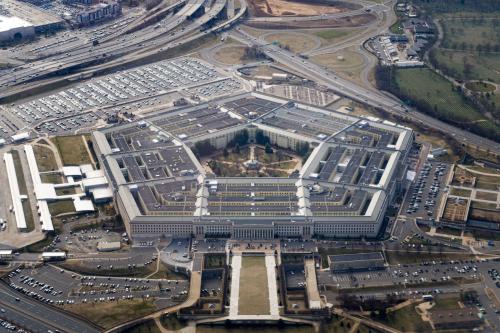Editor’s Note: The following article is one of a series of reports based on Vanda Felbab-Brown’s fieldwork in Afghanistan in April 2012. Here she discusses the recently signed U.S.-Afghanistan strategic partnership and argues a quick draw down in U.S. troop levels will deprive Afghanistan of the tools needed to improve stability and governance. Read also her recent reports on the progress of Afghan security forces in “Firefight in Kabul,” and on governance problems in Afghanistan in “The Road to Jalalabad.“
The signing of a long-term strategic agreement between the United States and Afghanistan is a crucial step in the continuing effort to stabilize the Afghan nation. The agreement is meant to define the role of U.S. military forces after 2014, when U.S. military presence will be greatly reduced, and to motivate allies to continue investing militarily and economically in Afghanistan. Most importantly, the agreement seeks to reassure Afghans and Afghanistan’s neighbors that the United States will not again abandon Afghanistan, as it did in the 1980s, and allow the country to disintegrate into chaos and civil war.
Indeed, the pervasive mood among Afghans is one of uncertainty and fear about the country’s future after 2014. During a just completed trip to Afghanistan, I had the opportunity to meet Afghans from many segments of society — from villagers in the north to urban elites in the southeast. Across the board, they fear that a precipitous U.S. military withdrawal in 2014 will once again plunge Afghanistan into civil war. These national anxieties, which have ominous implications for the post-2014 political and security situation in Afghanistan, are intensifying.
But Afghanistan’s future is not determined yet. While Afghans are tired of the U.S. presence and the lack of security, they are even more tired of war. The vast majority of Afghans do not want the United States to leave in 2014, even if they seek limits on the scope of U.S. military operations and demand greater accountability for U.S. actions, especially unpopular ones such as detentions and night raids. The signed strategic agreement does in fact give ownership and far greater control over such operations to the Afghan government and security forces. It also commits the United States to a continuing military presence in Afghanistan at least through 2024 and continuing U.S. investment in country’s economic development through that date. Signing the agreement before the NATO Summit in Chicago also helps strengthen allies’ resolve to persevere in Afghanistan.
But although the strategic agreement is an important positive signal, it remains to be seen to what extent it will in fact reassure Afghans and help halt some of the negative security dynamics ramping up in the country, including pervasive hedging on all sides and preparations for a civil war. Unfortunately, the phrasing President Barack Obama employed during his speech last night continues to reflect the ambiguities and ambivalence in U.S. policy; and Afghans are bound to pick up on them. Thus, Obama juxtaposed America’s long-term commitment and reassurance with the determination to finally end the war. The White House continues to define the mission in Afghanistan, especially after 2014, in terms of narrow counterterrorism designed to prevent the reemergence of al Qaeda safe havens in the country. There is little in that definition of U.S. objectives that resonates with the Afghan people. What they want is a U.S. commitment to end the pervasive insecurity that the Afghan people experience daily that stems from a many sources—the various Taliban groups, criminal bands, and militias—and has very little to do with al Qaeda per se. The president also spoke of “steady military reductions” in U.S. troop levels in Afghanistan after the end of this year. That phrasing seems to suggest that the United States will not maintain the 68,000 troops in Afghanistan in 2013 that the U.S. military would prefer. Yet too fast a reduction in U.S. military presence will critically undermine the military transition in Afghanistan, inhibit the growth and much-needed improvement of the Afghan National Security Forces, and risk undermining whatever military successes have been achieved since the surge of U.S. troops in 2009.
The Obama administration has assiduously avoided the terms nation-building or state-building to describe its objectives in Afghanistan. But despite the common belief that the Afghans want to be left alone by outsiders and by a central state, it is in fact precisely a promise of improved governance that the Afghan people want to hear. They want an Afghan state that provides basic security, not just by bombing al Qaeda camps in Pakistan or Afghanistan, but by reducing pervasive crime and impunity and by reducing insecurity generated by disgruntled groups and the Taliban. They want a government that delivers public goods and does not predate on its people. For they overwhelmingly believe that they live under a mafia state that acts with utter impunity.
It was thus very important that President Obama emphasized a U.S. commitment to transparency, accountability, and human rights in Afghanistan in his speech on Tuesday night. However, it remains to be seen whether the United States and the international community will prove capable of helping Afghans invigorate such processes in the country. The faster the United States draws down militarily and the more narrowly it restricts its mission to counterterrorism, the more it will deprive itself of the tools to stimulate such improvements in governance. And without these necessary improvements in governance, any security gains in Afghanistan will be extremely fragile and hard to sustain after 2014.



Commentary
Op-edAfghanistan Trip Report III: The U.S.-Afghanistan Strategic Partnership: An Important, but Ambiguous Signal
May 2, 2012